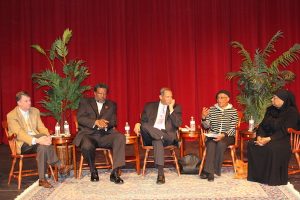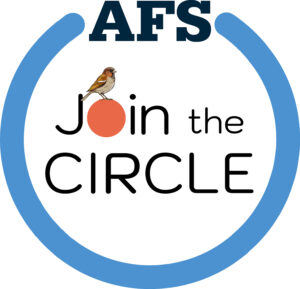The Susan Salesky Rudin ’57 Distinguished Visiting Professorship Lecture brought four Philadelphia Muslims to campus on Wednesday for a forum aimed at creating a better understanding of their religious beliefs, and reducing the misunderstandings that conflate Islam with terrorism.
Asked by a student what should be the first step to educate people accurately about the beliefs of Muslims, one of the panelists, Zakiyyah Abdul-Raheem, didn’t miss a beat. “Forums like this,” she said. “Talking about what Islam is really about. It is one of the best ways to attack it.”
Head of School Rich Nourie introduced the panel on the Muller Auditorium stage by noting that while the United States as a whole is largely unfamiliar with Islam and the diversity within Muslim communities, the Philadelphia region has a different story — one of long-standing relationships with Muslim neighbors.
The invitation to speak at Abington Friends was prompted, in part, by the acrimony directed toward Muslims and other groups during the Presidential primary election cycle, he said.
“We have been listening carefully to the rhetoric of this past political season, which has been divisive and toxic, with dangerous policies about exclusion, closing borders, sowing suspicion and fear. It’s been in several different directions and we see it all over the world, not just in the United States.
“There is a rising tide of anti-semitism in the world right now. There is fear and the distress of refugees. We see dangerous talk about Mexicans, and certainly about Islam and our Muslim brothers and sisters.
“As a peace-building school, we recognize the peril of distance. When we are able to view others from a distance, and make them less than human, injustice, oppression and violence become possible. Those things are impossible when you are close and in a relationship,” Rich said.
Malik Mubashshir, imam at the Muslim Community Masjid Association in West Philadelphia, assembled the panel, which also included Dr. Rashidah Abdul-Khabeer, founder and executive director of the Islamic Social Services Association of Philadelphia, and William Jacobs Jr., known as Brother Jake, who also is actively involved in the Muslim Community Masjid. Panelist Zakiyyah Abdul-Raheem is a past president and former executive director of the East Mt. Airy Neighbors civic group.
Malik, a longtime Friends educator, had spent the last day and a half at AFS as a visiting scholar as part of the Rudin Lecture series. He said he came to AFS because he thought the theme of Muslims in Philadelphia would help students “see the human face of Muslims here.”
During the panel discussion, he alluded to a rich discussion that occurred Tuesday in one of French Teacher Dina Cohen’s classes. The topic was blasphemy, the western notion of scrutinizing and mocking religion and whether Muslims should adapt to it? The students had discussed the violent attack on the satirical French magazine, “Charlie Hebdo,” which had printed cartoons of Prophet Muhammad. Muslim extremists, who considered the cartoons blasphemy and a direct attack on their faith, killed a dozen journalists.
Malik cited a passage in the Quran, the holy text of Islam, that says a Muslim is supposed to respond peacefully when someone disrespects the Quran in their presence. “The Quran says you get up and you leave. And it says when the conversation changes, you come back and join the group.”
Brother Jake, too, said that violence was not part of his religious beliefs, and even though terrorists claimed they were acting in the name of Islam, that did not make it so. “The Quran has none of that craziness in it. The human being is precious,” he said.
Each of the panelists talked about the personal journey that had led to their declaration of faith as Muslims. Rashidah, who is widely known in Philadelphia for her good works, said the religion had transformed her life. “It did find for me a place of quiet and peace,” she said.
Susan Salesky Rudin ’57, who attended the panel discussion, and her husband, Jack, established the lecture series in 1998. Over the years, the series has brought to campus a wide range of compelling voices and diverse perspectives on topics in the arts, environment, politics and public service.

